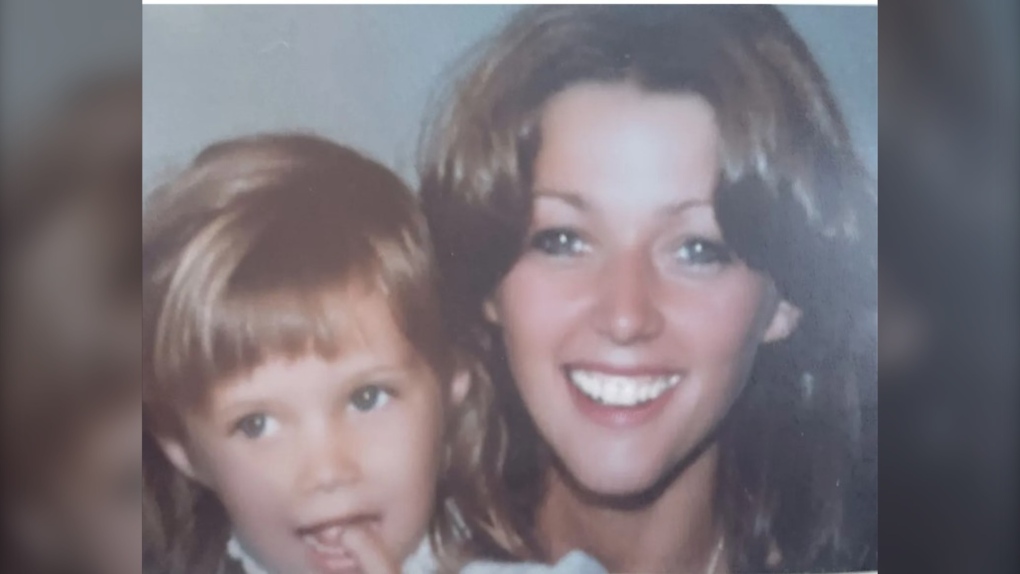Who killed Sonia? Decades-old cold case murder blown open by new scientific evidence
Sasha Stone was only four-years-old when her mother was attacked and strangled to death in October of 1981 in her home in Carmel by the Sea, California — a community known for its white sand beaches, surfing and vibrant arts community.
Growing up without her mom took its toll. Stone recalls having traumatic nightmares that started when she was five.
- Is the full episode above failing to play? You can watch it here
 Growing up without her mom took its toll on Sasha Stone. She recalls having traumatic nightmares that started when she was five. (W5, supplied photo)
Growing up without her mom took its toll on Sasha Stone. She recalls having traumatic nightmares that started when she was five. (W5, supplied photo)
“I was Little Red Riding Hood…there was this terrifying wolf that was chasing after me that had …killed my family…It was terrifying, and I would wake up screaming on a regular basis,” she tells W5.
She was also angry. Angry about the lack of answers, about the fact her mother’s killer had never been caught. She made it her mission to make sure this case wouldn’t be forgotten.
While in her teens, she turned to detective Lins Dorman -- one of the original detectives on the case.
“I marched into Lins’ office… and said ‘why haven’t you re-opened this?’”
Her mother was Canadian Sonia Herok-Stone -- a 30-year-old enjoying a flourishing career with Levi-Strauss at the time of the murder.
And Det. Dorman was one of the first on the scene that day in 1981.
“My first impression was that I knew this person had struggled for her life… her clothing was basically completely removed….I couldn’t tell what was around her neck, but it turned out to be her pantyhose,” he said.
Dorman encountered the man he believed to have killed Sonia -- Michael Glazebrook -- one day after the murder, while canvassing Sonia’s neighbourhood. He detailed his initial impressions of Glazebrook in this official report.
“The first thing I notice about him is that he’s extremely musclebound. He’s got a T-shirt that’s stretched so tight you can see every muscle in his back and his arms… I’m immediately drawn to his right cheek,” he said. “He’s got this deep red scratch.”
 Mugshot of Michael Glazebrook (W5, supplied photo)
Mugshot of Michael Glazebrook (W5, supplied photo)
During that initial meeting, Glazebrook -- a 25-year-old who recently moved into the area -- gave Dorman three different stories about his whereabouts the day of the murder, as well as how he got the scratch on his face.
“He told me the first story was he went over to his father’s house, and didn't mention anything about cutting himself,” said Dorman. “The second story was that he cut himself on the day she was murdered and went to the hospital and was kept overnight. And the third story was that he cut himself on the 16th.”
Dorman says Glazebrook also appeared to be on edge.
“He was fidgeting, he was hemming and hawing, his voice was stammering… I’m thinking, boy, this guy is really nervous,” he said. “This could be our guy.”
 File photo of Det. Lins Dorman, who was one of the first on the scene of the murder of Canadian Sonia Herok-Stonein in 1981 (W5, supplied photo)
File photo of Det. Lins Dorman, who was one of the first on the scene of the murder of Canadian Sonia Herok-Stonein in 1981 (W5, supplied photo)
Glazebrook’s trial lasted 18 days, and in a devastating blow, the judge ruled that none of Det. Dorman’s interrogation of Glazebrook could be presented to the jury because Glazebrook had been picked up on a traffic warrant, but questioned about a murder investigation.
Glazebrook’s 1983 trial ended in a hung jury, but neither Dorman nor Stone ever gave up their search for answers. Long after retirement, Dorman continued to keep tabs on the case, often calling the sheriff’s office for information.
“My last day in the sheriff’s office was January of 1992 and they were still on my mind.”
CASE RE-OPENED
But in 2020, the Monterey County District Attorney’s office re-opened Sonia’s case and assigned Det. Arras Wilson to review it. Wilson spent time reviewing Dorman’s files and early on, reached out to him to discuss the case.
The new investigation led to a breakthrough and 67-year-old Glazebrook was ultimately convicted and sentenced for the murder of Herok-Stone.
While grateful the person who killed her mother is behind bars for life, Stone, now 46, has since channeled her energy into advocacy.
She fights for victims’ rights and restorative justice -- an approach that encourages offenders to take responsibility and recognize the harm they have caused, through discussions with the victim and community members.
“Work in restorative justice is having great success stories of people actually understanding the impact of what they did… ‘let me make better choices’ so we’re not just releasing them back onto the streets and causing the same problem.”
Stone says the most effective approach is to attempt to stop criminals before any crime is committed.
“It’s actually paying attention to… what’s going on with him? What’s happening to him? Before he even goes to the next step.”
In April 2023, Stone took the stage as the inspirational speaker for the National Crime Victims’ Rights Week ceremony in Salinas, Calif., where she spoke to a crowd of people and others who have lost loved ones to violence.
“I wish I could say that the impacts of trauma and violent crimes could be something we could just shake off… but it takes so much more… it takes building inner strength and stamina, human humility, compassion, grace, generosity, forgiveness,” she told the crowd.
She paid special tribute to the person who continues to motivate her to do this work, her mother.
“She was a best friend to a group of Montreal adventurous kids who grew up together and eventually moved down to California to pursue their dreams,” said Stone. “She was a beautiful bride. She was a wife. She was a hardworking, business-minded, independent, talented young seamstress,” said Stone. “She was my mother.”
 Sasha Stone was only four-years-old when her mother was attacked and strangled to death in October of 1981 in her home in Carmel by the Sea, California (W5, supplied photo)
Sasha Stone was only four-years-old when her mother was attacked and strangled to death in October of 1981 in her home in Carmel by the Sea, California (W5, supplied photo)
W5’s investigation, “Who Killed Sonia,” reveals why Glazebrook managed to roam free for decades and exposes what scientific evidence led to the eventual dramatic breakthrough in the case. Watch the episode for more.
Det. Dorman never got the chance to meet Sonia Herok-Stone, but finding the killer more than 40 years later still means the world to him.
“He took her life away, took away a mom, took away a sister. Took away a daughter. I know how I feel and I’ve lost a loved one. It’s a horrible feeling because you’ll never ever see them again. They’ll never come back. And that’s how this case affects me.”
CTVNews.ca Top Stories

Czechia scores late to eliminate Canada from world juniors
Jakub Stancl scored his second goal of the game with 11.7 seconds left in third period as Czechia survived a blown 2-0 lead to defeat Canada 3-2 and advance to the semifinals at the world junior hockey championship on Tuesday.
Canadian couple lives on cruise ships — with no plans to return to land
With 75 countries and territories visited, a retired Canadian couple is making the most of life as they cruise full-time, from coast to coast. They're part of a growing trend of people opting to retire at sea.
Planes catch fire after a collision at Japan's Haneda airport, killing 5. Hundreds evacuated safely
A passenger plane and a Japanese coast guard aircraft collided on the runway at Tokyo's Haneda Airport on Tuesday and burst into flames. Transport Minister Tetsuo Saito confirmed that all 379 occupants of Japan Airlines flight JAL-516 got out safely before the plane was entirely engulfed in flames.
BREAKING Israeli strike in Lebanon kills senior Hamas official Saleh al-Arouri: security sources
Senior Hamas official Saleh al-Arouri was killed on Tuesday night in an Israeli drone strike on Beirut's southern suburbs of Dahiyeh, three security sources told Reuters.
A missing person with no memory: How investigators solved the cold case of Seven Doe
Police specializing in missing people and cold cases have discovered the identity of a woman with no memory in one of the most unusual investigations the sheriff's office has pursued and one that could change state law.
Tim Hortons reveals which three doughnuts will join Dutchie in returning to menu
Tim Hortons has revealed which three retro doughnuts will join the Dutchie in returning to its menu next week.
Weight-loss drugs: Who, and what, are they good for?
Extraordinary demand, and high prices, for powerful weight-loss drugs will keep them out of reach in the coming year for many patients who are likely to benefit.
Woman who fell out of Edmonton city bus dies
A woman who fell out of an Edmonton city bus Friday has died, police said in a media release issued Monday.
Canada's 100 highest-paid CEOs broke new compensation records in 2022: report
Canada's 100 highest-paid CEOs broke records with their compensation in 2022, according to the Canadian Centre for Policy Alternatives.




























